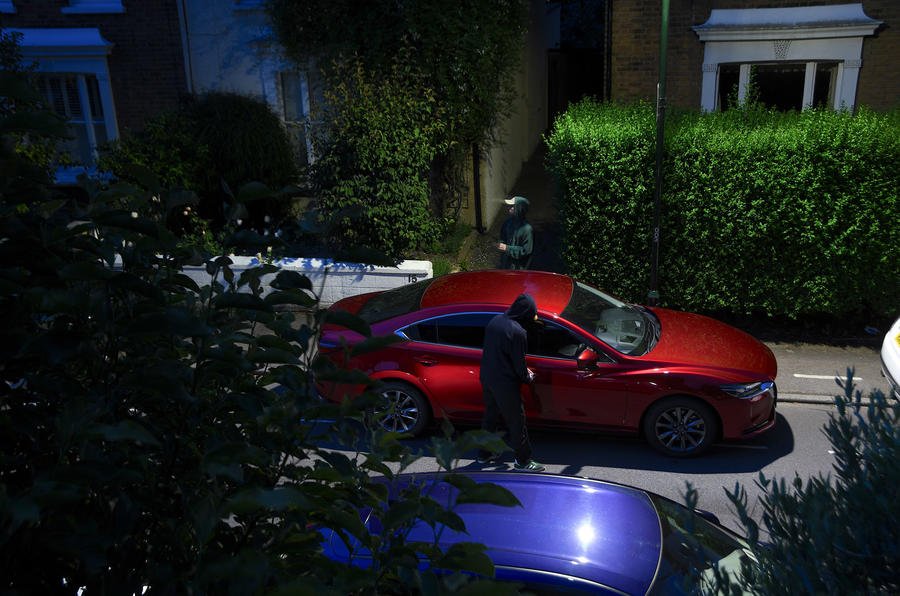Cat burglers: the victims of catalytic converter theft

Chris King became so stressed about thieves targeting his Toyota Auris for a second time that he sold it and now travels by bus.
“The first time they stole my car’s catalytic converter was in April at quarter to one in the morning,” he says. “I was woken by a loud crash, followed by a car screeching away. I had the converter replaced with a new one, but my neighbours said it would only be targeted again. They were right. Three months later, the thieves returned, this time in daylight at seven o’clock in the morning.”
The crooks managed to only partially saw through the new converter before fleeing. A neighbour got some grainy footage of them on his mobile phone, but they were all wearing masks and had removed their car’s numberplate. According to figures obtained from police forces in England and Wales by BBC Radio 5 Live, 13,000 catalytic converters were recorded stolen in 2019, compared with 2000 the year before. However, anecdotal evidence suggests that in reality, these numbers are far higher.
What attracts thieves to the converters is the precious metals – rodium, paladium and platinum – that they contain and whose prices have risen steeply in recent years. Easily the highest-riser is rodium. In 2014, an ounce cost around £750, but today the same amount will set you back £9000, or seven times more than gold.
Because their converters are less contaminated by exhaust gases, hybrid cars are favoured by thieves, although SUVs of all makes are also targeted for the easier access they offer to the vehicle’s underside. A new replacement converter costs around £1000.
Toyota’s website carries reports from owners of Auris and Prius models whose converters have been stolen. Hugely increased insurance premiums (some by as much as 600%) and even being refused cover are among the problems they claim to have experienced, while others accuse the company of not doing enough to alert prospective car buyers to the issue.
Toyota says that to discourage theft it has reduced the precious metals content of the converters it fits to its newer models, while making available a converter-locking device at cost as well as tilt alarms and component etching. It says it’s working with the government and police forces to raise awareness of the problem and tighten up legislation.
Videos uploaded to YouTube of thieves stealing converters show how brazen the crooks are. A car containing the gang will pull up alongside the target vehicle, occasionally in broad daylight. One of them stands guard while an accomplice jacks it up. Another crawls underneath it to saw off the converter and, once it has been removed, his mate releases the jack and they’re gone. Around 60 seconds is all it takes.
The stolen converter may be sold to an unlicensed scrap metal dealer or to companies that openly advertise for used converters. Alternatively, it may be sold online, where prices range from £50 to £500. One major online organisation, Facebook Marketplace, told Autocar it has checks in place to identify rogue sellers and remove stolen goods from its site.
Used converters may also be sold to companies that process them for recycling. Around 150,000 used converters are scrapped each month. FJ Church is a leading UK-based processor that deals with up to 60,000 of them. The company sources converters from places such as salvage yards and breaks them open to access the ceramic honeycomb carrier to which the precious catalyst metals are bonded. It crushes the material to a fine dust before shipping it to chemical companies and converter manufacturers for separation and recycling.
Daffyd Dylan, commercial manager for catalytic converters at FJ Church, says business is booming. “China and the US are leading the demand for the material, while across the world car makers are insisting on higher levels of precious metals to avoid emissions fines. Investors have jumped in and are helping to push prices higher.”
Dylan says that last year his company began receiving offers of scrapped converters from suppliers who refused to tell them where they had got the components from. In response, the company asked for a copy of the V5 vehicle registration document relating to each unit. This became an administrative nightmare, he says, so now the company will only deal with licensed traders and refuses to pay cash: “We know there are a lot of buyers of stolen converters because increasingly they say to us ‘I can get a better price for cash elsewhere’. It’s frustrating. Local councils and the Environment Agency need to tighten up site inspections and close down rogue operators.”
On that point, BBC Radio 5 Live reported that of the 243 councils it approached in 2018, only a fraction had inspected scrap dealers. Meanwhile, in February this year, it found that 120 councils hadn’t visited or inspected any scrap dealers in the previous 28 months. Councils say they have limited resources and are asking the government to introduce greater enforcement powers.
Related News
